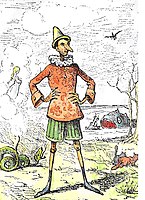
Second-Order False Beliefs and Linguistic Recursion in Autism Spectrum Disorder.
Sign Up to like & getrecommendations! Published in 2021 at "Journal of autism and developmental disorders"
DOI: 10.1007/s10803-021-05277-1
Abstract: This study investigates the role of recursive language and working memory (WM) in second-order false belief skills in Danish-speaking children with autism spectrum disorder (ASD; n = 62; 8 females) and typical development (n = 41; 15 females), ages… read more here.
Keywords: second order; false belief; order false; autism ... See more keywords

Late, but not early, arriving younger siblings foster firstborns’ understanding of second-order false belief
Sign Up to like & getrecommendations! Published in 2018 at "Journal of Experimental Child Psychology"
DOI: 10.1016/j.jecp.2017.08.007
Abstract: Highlights • Few studies have examined the influence of siblings on theory of mind in middle childhood.• A second-order false belief task enacted with Playmobil® figures was given to 229 7-year-olds.• Children with younger siblings… read more here.
Keywords: order false; second order; early arriving; false belief ... See more keywords

Theory of Mind and Preschoolers’ Understanding of Misdeed and Politeness Lies
Sign Up to like & getrecommendations! Published in 2019 at "Developmental Psychology"
DOI: 10.1037/dev0000666
Abstract: We told ninety-nine 4- and 5-year-olds stories in which speakers told lies and truths in two contexts: those told to deny a transgression (misdeeds) and those told to spare another’s feelings (politeness). Participants identified each… read more here.
Keywords: order false; year; lies truths; year olds ... See more keywords

Being Deceived: Information Asymmetry in Second-Order False Belief Tasks
Sign Up to like & getrecommendations! Published in 2020 at "Topics in cognitive science"
DOI: 10.1111/tops.12422
Abstract: We analyze four well-known second-order false belief tasks. Superficially, all four tasks share a common logical structure: All are based around a principle of inertia, which says that an agent's beliefs are preserved over time,… read more here.
Keywords: false belief; belief tasks; order false; order ... See more keywords